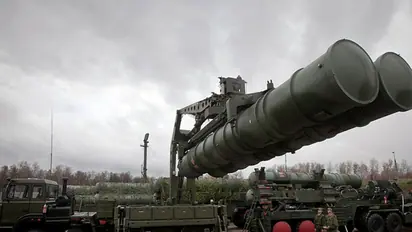
New Delhi: Apart from being a game changer in protecting the nation's boundaries, the Rs 40,000 crore S-400 air defence missile system deal is also being seen as significant in terms of the speed at which it was sealed by India and Russia on Friday.
The intent to sign the deal was first expressed in October 2016 when Prime Minister Narendra Modi met Russian President Vladimir Putin during the BRICS summit in Goa.
According to senior government sources closely associated with the deal, nothing much happened in the deal till October 2017 when Modi met Putin again in Ufa in Russia where the issue of progress in the deal had come up for discussion.
On Modi's return from Russia, it was found during the review of the project that a lot a work was yet to be done.
At that time, defence minister Nirmala Sitharaman was also new in office as she had taken over only a month ago, in September 2017.
During the internal discussions on the issue, defence secretary Sanjay Mitra suggested that to fasten up the project, the leadership of the contracts negotiations committee should be handed over to the Indian Air Force (IAF) as it was the end user of the equipment and would know what it wanted from the Russians.
Soon afterwards, the contract negotiations committee was formed under the then deputy chief of air staff, Air Marshal Raghunath Nambiar, with joint secretary and acquisition manager Sanjay Singh and current joint secretary (Navy) Richa Mishra as its other prominent members.
At that time, Mishra was representing the defence finance wing in the committee.
Before starting the negotiations, the committee faced issues in determining the benchmark price, but managed to do it soon. The first meeting of the negotiations
committee took place in February this year.
During this time, the entire team was constantly being pushed by the defence minister and secretary for completing the negotiations on time. In between, the threat of US sanctions on Russia was also casting a shadow over the procurement of the missile system.
The negotiations team used the threat of sanctions to the advantage of the country as they managed to get a huge concession of $900 million (approximately Rs 7,000 crore) from the Russians with the amount approved by the defence acquisition council being $6.3 billion.
During a round of negotiations held in May this year, the team almost clinched the best possible price and delivery terms and conditions from the Russians, because given the US pressure, a number of potential customers were backing away from the acquisition.
In the meantime, a team led by an air-vice marshal visited the original equipment manufacturer Almaz Antey's facilities in Russia where he was also shown the firing performance of the missiles. To hasten the deal and avoid cost escalation, the defence ministry also kept the offsets out of the contract.
Meanwhile, Mishra was appointed as joint secretary (Navy) but the ministry kept the Indian defence accounts services officer in the negotiations team for keeping up the momentum of the contract discussions.
By June-July, the team had completed the entire negotiations and made the deal ready for consideration and approval by the cabinet committee on security headed by Prime Minister Modi. The final approval came in September, before the visit of the Russian president.
The negotiations team was wound up two months before the deal was signed on October 3 by the two sides at a cost of $5.43 billion (Rs 40,000 crore) by the defence ministry.
Commenting at the work done by the negotiations team, defence expert Deba Mohanty said, "The superfast speed at which this deal has been done should be replicated in other contracts as well. If the government can manage this, the system can get rid of long delays in complex acquisition process of the defence ministry."